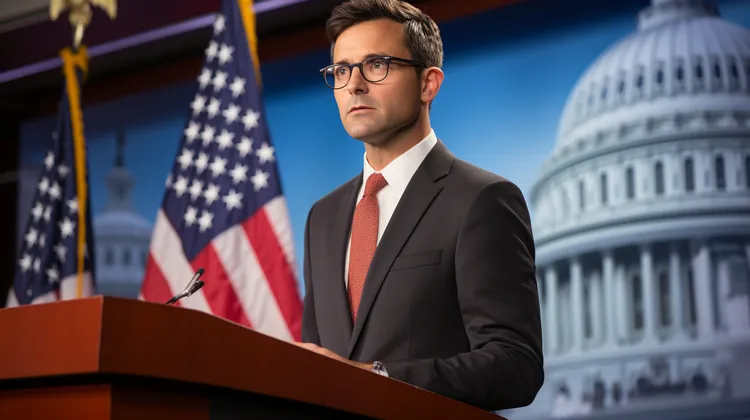
White House Derails U.S. House Stablecoin Bill Negotiations
In a recent statement, Representative Patrick McHenry accused the White House of interfering with the negotiation process regarding the U.S. House Stablecoin Bill. The proposed legislation seeks to establish a comprehensive regulatory framework to govern the use and issuance of stablecoins in the United States. McHenry claims that the White House’s involvement has derailed the negotiation process, further delaying the crucial legislation.
McHenry, who is the ranking Republican member on the House Financial Services Committee, voiced his concerns about the White House’s interference during a recent hearing on the matter. He argued that the administration’s involvement has led to a significant shift in the proposed legislation’s direction, deviating from the initial bipartisan agreement that the bill was based on.
The U.S. House Stablecoin Bill aims to provide regulatory clarity for stablecoin issuers, ensuring their compliance with existing laws and regulations. Stablecoins, like Tether or USD Coin (USDC), are a type of cryptocurrency designed to maintain a stable value, often pegged to a fiat currency like the U.S. dollar. These digital assets have gained popularity due to their ability to facilitate efficient cross-border transactions and serve as a stable store of value.
The White House’s involvement in the negotiation process has raised concerns among lawmakers who fear that excessive regulation could hinder the growth and innovation of the stablecoin industry. Critics argue that the Biden administration’s heavy-handed approach might stifle competition and inhibit the industry’s ability to provide accessible financial services to underserved populations.
It is unclear why the White House has decided to intervene in the negotiations on the U.S. House Stablecoin Bill. Some speculate that concerns about the potential misuse of stablecoins for illicit activities, such as money laundering or terrorist financing, have prompted the administration to take a more cautious approach.
McHenry and other lawmakers believe that the proposed legislation should strike a balance between protecting consumers and fostering innovation. They argue that excessive regulation could hamper the development of new technologies and prevent the United States from maintaining its competitive edge in the global digital economy.
The U.S. House Stablecoin Bill has received significant attention from industry stakeholders and regulators alike. The Securities and Exchange Commission (SEC), for example, has been closely monitoring the stablecoin market due to concerns regarding investor protection and potential market manipulation.
While negotiations on the legislation have hit a roadblock, McHenry remains optimistic about finding a bipartisan solution. He emphasized the importance of ensuring a regulatory environment that fosters innovation while safeguarding the financial system’s integrity.
As the stablecoin industry continues to grow and gain prominence, it is crucial to establish a coherent regulatory framework that provides clarity and protects consumer interests. The U.S. House Stablecoin Bill represents an opportunity to address the regulatory challenges associated with stablecoins and shape the future of digital finance in the United States.
While the White House’s involvement in the negotiation process may have temporarily derailed progress, it is essential for lawmakers to refocus their efforts and seek common ground. By promoting a healthy and balanced regulatory environment for stablecoins, the United States can position itself as a global leader in this emerging field, fostering innovation and economic growth.
12 thoughts on “White House Derails U.S. House Stablecoin Bill Negotiations”
Leave a Reply
You must be logged in to post a comment.
It’s important for lawmakers to refocus and find common ground despite the temporary setback caused by the White House’s involvement. The potential of stablecoins should not be ignored, and a coherent regulatory framework is crucial for their success.
The involvement of the White House has undoubtedly created some challenges, but it’s crucial for lawmakers to remain focused on finding a common ground. With the right balance, the United States can lead the way in the global digital economy.
The involvement of the Securities and Exchange Commission shows that the stablecoin market needs regulatory clarity. It’s important to protect investors while promoting a healthy and competitive environment for stablecoin issuers. 💼🔐
It’s crucial for the United States to maintain its competitive edge in the global digital economy. A well-regulated stablecoin industry can contribute to innovation, economic growth, and the provision of accessible financial services.
The concerns about misuse of stablecoins and illicit activities should be addressed, but it’s equally crucial to avoid overregulation. Let’s work towards finding a middle ground that promotes responsible growth and development of the stablecoin industry.
The White House’s involvement is causing unnecessary conflict and hindering progress on the stablecoin legislation. This needs to be resolved quickly.
McHenry has every right to be concerned about the White House’s interference. Their input is derailing the entire process and hindering innovation.
The stablecoin industry has the potential to revolutionize cross-border transactions and financial services. It’s crucial to establish a regulatory framework that not only protects consumers but also encourages innovation and fosters economic growth. 🌐💼
The regulatory challenges associated with stablecoins require careful consideration and collaboration. It’s important to strike a balance between innovation and consumer protection to ensure the long-term success of the stablecoin industry.
Representative McHenry is absolutely right in highlighting the concerns about the White House’s interference. It’s important to keep the negotiation process unbiased and based on the initial bipartisan agreement.
It’s encouraging to see Representative McHenry’s optimism for a bipartisan solution. Collaboration and finding common ground are crucial to shape the future of digital finance in the United States.
To ensure the long-term growth and stability of the stablecoin industry, it’s important to address concerns without stifling innovation. Let’s work towards a regulatory framework that strikes a balance between industry growth and consumer protection.